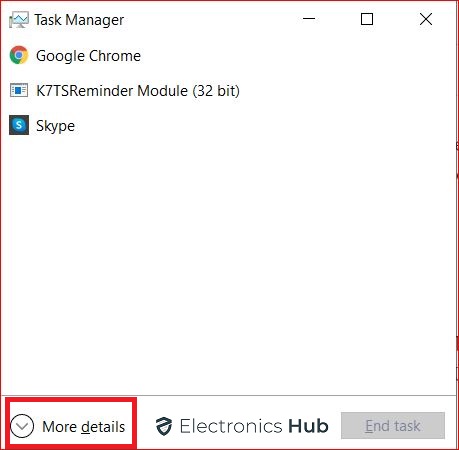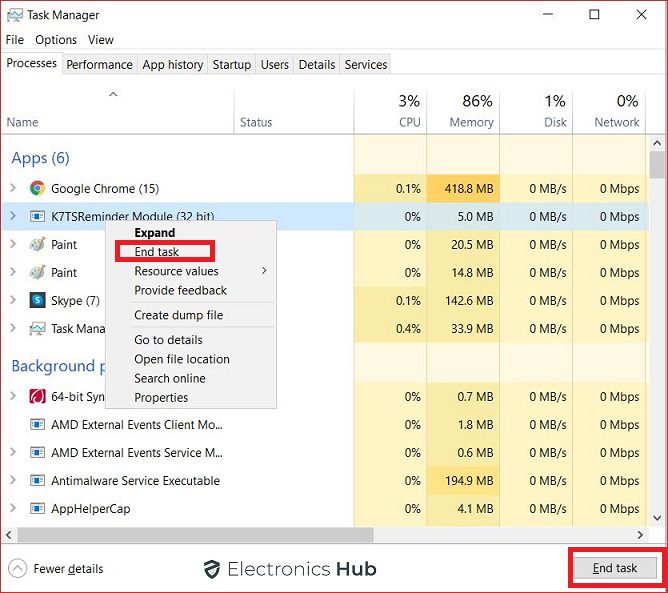If your laptop fan is very loud, it is annoying and indicate problems like overheating or dust buildup. This might happen if you’re using intense software that stresses your CPU or if your cooling vents are blocked. Knowing why your laptop fan is so loud is important. This guide will explain common reasons for a noisy laptop fan and give you practical solutions to help your computer run quieter and more efficiently.
Outline
ToggleWhy Is My Laptop Fan Sound Loud?
Fans push air when they are operational. The amount of air pushed per second depends upon the rotational speed of the fan. This is basic mechanics of all types of fan. Laptop fans are generally very compact in size so that they can easily fit inside the chassis of a laptop. Therefore, the RPM of a standard laptop fan is quite high. For gaming laptops, you can adjust the RPM even up to 5000 RPM.
But, laptop fans are designed to be quiet even though they’re operating at such a high speed. Therefore, if you are noticing loud noise from your fan, it means that there are some problems with your laptop that are causing the fans to perform abnormally. There can be many reasons behind a loud laptop fan which we cover in detail below.
1. Software Problems
Fan speed is mostly controlled by the motherboard on your laptop. But, it can also be managed with the help of software. Most laptop manufacturers include a management software along with the laptop which controls various settings like lights, LED color, fans, the brightness of the display, and many others. If there is a problem with the software, you will notice changes in the peripherals that are controlled by that program.
For example, if a 3rd party program is interfering with the controlling software, you will not get ideal performance. You will notice different behavior from the peripherals, such as abnormal fan speed, which creates a loud noise. It can be solved by checking the program installed on your laptop and making sure all the settings are correct.
Another reason can be a newly installed update of software that is continuously running in the background and causing a high power draw for all components. This will increase the overall temperature of your laptop and, in turn, cause the fans to rotate at a faster pace. Thus, the fans will generate more noise than usual due to the additional load. You can always check the task manager to see the active programs and check for any unusual behavior.
2. Blocked Ventilation and Dust
We all know that ventilation needs to be an open cycle so that the heat can be dissipated on the outside. In the case of a laptop, the space available for ventilation is already pretty narrow, which barely offers enough heat dissipation.
If the vents are blocked by external means, the ventilation cycle will struggle even more and cause the temperature to rise inside your laptop. This will send a signal to the fan to run at a higher speed to compensate for the added temperature, which will increase the noise levels.
The ventilation can be blocked by any means. In most cases, the design of the laptop itself is the culprit as the laptop rests completely on its back, leaving little to no space for airflow. Even if your laptop’s design is better, you should consider getting a laptop cooling pad that comes with quiet fans for better ventilation.
Other than that, there could be dirt or dust settled on the fans or inside the vents, which block the airflow. This also makes the fans operate faster so that enough pressure could be generated to dissipate heat from the dusty vents. To resolve that, you will have to clean your laptop. You can either do that yourself or submit your laptop to a service center for better results.
3. Hard Disk Problem
The laptop fans are not the only peripherals in your laptop that have moving parts that generate noise. The hard drives also include moving parts that can create unusual sounds if there is a problem with them. And, it is pretty common to get confused whether the sound is coming from the hard drive or the cooling fans as the sound also comes out from the same ventilation ports.
If you listen closely, you will notice a whirring noise in the area near the hard drive if there is a problem with it. If you do so, we will recommend you back up your data right away as the hard drive can get damaged at any time. Usually, when the internal mechanical components inside a hard drive fail, the drive generates a lot more noise than before. In such a case, replacing the hard drive is the only solution.
But, if your laptop has an SSD instead of a hard drive, you should not worry about this factor at all. SSDs are built without any internal mechanical or moving parts. Hence, there is usually no sound coming out of your SSD unless there is an electrical problem.
4. Virus or Malware
Viruses or malware can also cause problems with your hardware as well similar to the operating system or the software of your laptop. Right now, there is much powerful malware spreading in the network, which causes intensive resource consumption in the laptop and causes it to overheat very quickly. This results in fast fan RPMs which generate a loud noise.
One of the most common malware that is capable of such damage is cryptocurrency miners. These programs take control of your CPU’s power and use it to mine cryptocurrency. While this will make your laptop fans louder, it will also slow down your laptop and offer an overall weaker performance.
Other than that, there are many different types of malware that can cause strain on the components of your laptop. To resolve that, you will have to carry out a deep scan of your system and check every folder and file for malware. If that fails, you should also try formatting the system and the hard drive completely to get rid of the virus.
5. Driver Issues
As you may already know, drivers are one of the core components of the Windows operating system. Hence, a problem with the driver causes problems with the system’s performance and,, indirectly, problems with the hardware as well. If the drivers that are being used in your laptop are outdated or misconfigured, they can impact the efficiency of the laptop. This usually results in high-temperature levels for components as well as problems in the system.
Due to high-temperature levels, the system requires additional power to maintain the temperature levels, which causes the fans to run faster and louder. You can fix that by checking Windows updates as well as individual drivers for your graphics card, audio, display, and all other components.
How To Make Laptop Fans Quieter
Now that you know what are the factors that can cause loud fans inside a laptop, let’s focus on how you can resolve the problem and keep it that way in the future. These are some helpful solutions that will definitely help you maintain the temperature levels on your computer and keep the fan speeds in control which will also reduce the noise levels.
1. Eliminate Background Operations
If you use your laptop for multiple tasks at once, you probably have a lot of background processes running at once without even knowing it. These processes cause additional load on your laptop, which messes with its performance and temperature levels. If your laptop is running loud, you can try eliminating some background operations which are not necessary.
- Open the task manager by pressing “Ctrl+Shift+Esc” simultaneously.
- Click on the “More Details” option to expand the task manager.
- Now, you will see all the active processes on your laptop.
- You can sort the processes by ascending or descending order of resource consumption by clicking on the top of the column.
- For example, you wish to check CPU-intensive processes, click on the box that says CPU along with current CPU usage.
- Now, check the processes and find out if there are some unnecessary ones on the list.
- If found, simply right-click on the process and select “End task”.
- Repeat the steps for Memory, Disk, Network, and GPU as well.
- Once the processes are eliminated, your laptop fans will slow down in some time, reducing the noise levels.
2. Clean The Laptop From Inside
Dust is an unavoidable part of any stationary system. If you keep your system covered while using it, the ventilation will be blocked. And if the system is open, dust will enter and settle on parts like vents, fans, motherboards, and everywhere else. To get rid of the dust inside the laptop, the only option you have is to clean the it thoroughly. This includes opening the laptop and blow-drying it with pressurized air to get rid of dust completely.
Even after that, you will find dust that is stuck and cannot be cleaned by simply blowing air on it. You will have to separately clean such dust with a cloth. We will suggest using a microfiber cloth so that it won’t get stuck on any internal part of your laptop.
Apart from the dust on the internal surface of the chassis and on the motherboard, you should also check for the dust stuck on the fans. As the fans deal with most of the airflow, the dust usually gets stuck inside the fan, causing them to make a louder noise when they are running.
If you are not confident enough to clean the laptop yourself, you can always reach out to the service centers and ask them to do so. Most shops will charge a minimal fee which is worth it to get the increased performance and reduced noise levels back on your laptop.
3. Manage Temperature Levels of Your Laptop
If your laptop is not maintaining normal temperature levels by itself, you will have to introduce an external cooling method. This usually happens with older laptops that are running on less efficient cooling systems. With time, the efficiency of the cooling system of a laptop also decreases, which causes overheating and loud noise in the fans.
To cool your laptop from the outside, you can get a cooling pad designed for laptops. The cooling pads are proven to be highly efficient for laptops as they help with faster heat dissipation and offer much better performance.
Other than that, you can get a laptop stand that includes external fans which will force air through the vents and help with heat dissipation. You can also find an additional external fan cooler which you can install directly over the laptop to extract hot air quickly.
Conclusion
Loud noise in general is very disturbing and annoying, especially if you are trying to focus on your work. It causes distraction and loss of focus which further reduces your productivity. The effects are even more drastic if the noise is coming from your own laptop.
If your laptop fans are running loud, you need to read our guide right now and find the reason behind the problem. You should also try some of the tips that we have provided in our guide. Hopefully, these tips will help you maintain your laptop’s temperature levels under control and make it run quieter than before.





